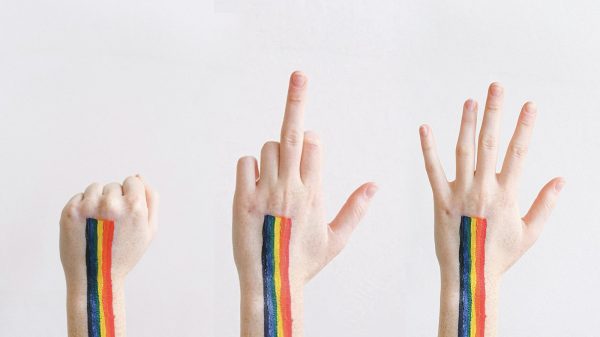This is part of #KaraniwangLGBTQIA, which Outrage Magazine officially launched on July 26, 2015 to offer vignettes of LGBT people/living, particularly in the Philippines, to give so-called “everyday people” – in this case, the common LGBTQIA people – that chance to share their stories.
As Outrage Magazine editor Michael David C. Tan says: “All our stories are valid – not just the stories of the ‘big shots’. And it’s high time we start telling all our stories.”
Tanya Lape – 35 years old from Balamban in the province of Cebu – was around eight years old when “I think I started to really feel that I’m a woman,” she said. “Because that’s when you start to questions things, right? And (when you) start to explore.”
Though Tanya grew up with her grandparents, she recalled being surrounded by women (e.g. her older sister and her aunts) as a kid. “I think that was one of the factors why I already felt I’m really a woman.”
Tanya started transitioning at 18.
“I was very curious about (this) already even when I was still in high school. (But) I already mingled with (other) transgender women who have already transitioned. So I listened to their stories, and their advice on what pills to take. The hormonal pills they recommended were available OTC (over the counter). But I saw that they (were successfully transitioning). Because their breasts developed nicely, they weren’t muscular, and they had smooth skin. So I wasn’t scared then to voraciously consume those things just to (transition),” she recalled.
It would also be around that time when she started getting known as Tanya.
In high school, she had a barkada of six or seven seven friends, and “we always associated ourselves with celebrities. At that time, (TV and film actress) Tanya Garcia was the most popular,” she smiled.
FAMILY DYNAMICS
It was a very difficult situation for Tanya’s family, especially for her father.
“Even though he already accepted me as a feminine (person), never in his wildest dream did he see me transition into a woman,” she said.
And so Tanya ran away from home, staying with her friends to “push through with my happiness”, which was “to transition.”
“Life way back then was very difficult and very challenging,” she recalled. “There were so many hurtful words that were thrown at me, coming from them. But I never (held) any grudge against them.”
At least her elder sister was supportive of her.
“There were two of us (kids); I was the younger one. My sister has always been very supportive of me. She was one of my support systems at that time. She let me borrow her clothes. And also, she let me borrow money as well to buy my hormones,” Tanya said.

Their parents are not in the Philippines; they’re working abroad.
In 2010, a TV show – Pinoy Big Brother – featured Rica Paras, a transgender woman, who was also not accepted by her father. Paras’ conversation with her father, and how her father came to accept her, was televised.
“That scene in the show made my father talk to me because I wasn’t talking to them for three years,” Tanya said. “And that was really fulfilling, actually, because I was really waiting for my family to accept me.”
Now, Tanya’s message to families with LGBTQIA family members is “to try to reach out to them. Talk to them because I always believe that effective communication will always resolve every difference. That’s when you acknowledge their feelings, and that’s when you try to recognize their situation as well. Don’t treat them as different people because they are still your family members.”
LIFE’S HARDSHIPS
“I have encountered a lot of stereotyping, and also difficulties or discrimination,” Tanya said. “But I don’t pay these as much attention. Because if you are bothered by these too much, and then you retaliate, that won’t solve anything. So it’s better to just walk away. Just live your life, and move on.”
As a kid, “there was this fear whenever I went to school before. That I’d get bullied, or maybe someone will throw things at me.”
She channeled herself into sports “just to prove that I can be better than them, or I can be just as good as them. I proved myself that even if I am different, even if I am unique, I have the same skills as they have.”
Though she studied (and completed) Bachelor of Science in Nursing, Tanya currently works as a Fraud Supervisor with JPMorgan Chase (she’s been working with them for seven years now). But even if she’s okay where she is now, things weren’t always like that for Tanya.
“I did experience some difficulties during my first few weeks or few months (in) my first job. And it was really hard,” she said.
For instance, in one company that she applied for, “I (got perfect scores in) all of their exams. However, they wanted me to cut my hair, to wear men’s clothes, and all that. But that’s not me.”
She was also hired by a certain company in the past, “and my difficulty (while with them) was using the restroom. Because (for that company), transgender women should go to men’s restroom. It was very difficult to deal with (that) especially (since) you just want to go to the restroom.”
And while many trans Filipinos have left the country because they are unable to live their true selves here, Tanya said she’s choosing to stay. “I just think that there’s more work to be done here for (the benefit of) future trans gender men and women.”

PAGEANTRY FOR ADVOCACY
Tanya said her family is into pageants. “Even until now, I still join pageants,” she smiled.
That pageants may instead end up promoting lookism (that the LGBTQIA community is also battling) is not lost on Tanya.
But “when it comes to pageants nowadays, it’s totally different (from before),” she said. “It’s now more on what you can offer or what you are representing. So that’s the pageant now, compared (to what it was before and) it was more dependent on the looks. I always believed that beauty pageants (are) the biggest platforms to promote your advocacies or the things that you want to represent. And that should be the biggest purpose of a pageant.”
LOVE IS LOVE
Tanya is single right now; and she isn’t in any hurry to find love, particularly since she just came from a 10-year-relationship that didn’t work out. “I needed some time to fully heal.”
Tanya added: “To find love where I am? I think it’s difficult because you have to make sure that they will accept you for who you are and not just for what you have… We who are part of the LGBTQIA community need to be very cautious as well. We need to guard our hearts, and we need to guard our bank accounts as well.”
LGBTQIA ISSUES
There are still numerous issues that Tanya thinks the local LGBTQIA community should address.
First, there’s transgender health “because there are so many transgender teens now who are self-medicating. And I don’t think that (is) very ideal. You have to really consult a doctor who can really provide you the right pills for you.”
Second, there’s the need to increase transgender awareness “because there are still people here in my local community (who) categorize trans women as gay or bakla. And some trans men (are considered as lesbians). So I think with a transgender awareness program, it will help educate the people in my local community to have awareness of what transgenderism is.”
And then there’s the issue of pushing for unity within the LGBTQIA community in my local community because “I observed it is very divided.”

PEACE THROUGHOUT
For younger trans people, Tanya said finding inner peace is essential.
“My message to transgender teens is to stay as genuine as you can because at the end of the day, we will only have ourselves,” she said, adding for them to “be proud of who you are.”
To those already transitioning, “it is already the beginning of your new life.”
To those whose family may not fully accept them, “don’t lose hope. If your family won’t accept you at this time, try to understand them as well.”
And in the end, for the community as a whole, “I think there should be respect. Everyone should treat everyone with utmost respect regardless of their religion, their beliefs, gender, or anything (else). Because through respect, that’s when we will be able to achieve peace. Not just peace in the community, but peace within ourselves.”

The founder of Outrage Magazine, Michael David dela Cruz Tan completed BA Communication Studies from University of Newcastle in NSW, Australia; and Master of Development Communication from the University of the Philippines-Open University. He grew up in Mindanao (particularly Kidapawan and Cotabato City), but he "really came out in Sydney" so that "I sort of know what it's like to be gay in a developing, and a developed world". Conversant in Filipino Sign Language, Mick can: photograph, do artworks with mixed media, write (DUH!), shoot flicks, community organize, facilitate, lecture, and research (with pioneering studies under his belt). He authored "Being LGBT in Asia: Philippines Country Report", and "Red Lives" that creatively retells stories from the local HIV community. Among others, Mick received the Catholic Mass Media Awards in 2006 for Best Investigative Journalism, and Art that Matters - Literature from Amnesty Int'l Philippines in 2020. Cross his path is the dare (guarantee: It won't be boring).



































































